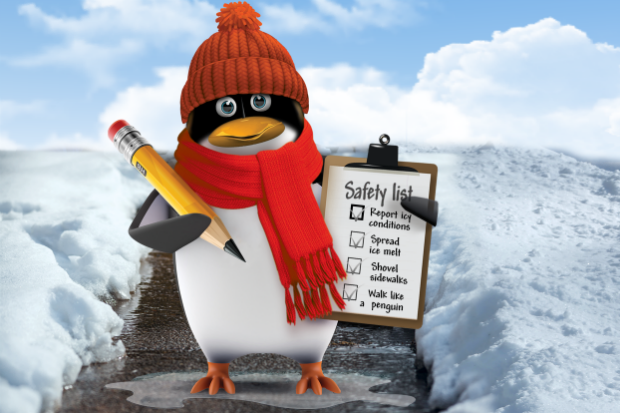
Issue 2 from CS Local Scotland wellbeing network.
Clearing ice and snow at home and work
In recent years, it has been suggested that by not touching snow/ice you cannot be sued if someone slips over, and that trying to make conditions easier for pedestrians could leave you open to claims if someone subsequently has an accident.
The Royal Society for the Prevention of Accidents (RoSPA) puts accident prevention ahead of fears about being sued if someone slips on a surface that has been cleared. Slips, trips and falls are the most common types of accident in life generally and are clearly more prevalent when conditions are icy.
On business premises, there is a duty to take reasonable care to ensure the safety of those using your land.
In public areas for example the pavement outside a shop/business, we would hope that shopkeepers and service providers would show public spirit and a wish to make access to their premises easier by clearing snow and ice. When open, they are inviting people to visit them, so we would hope that this would be reflected by the clearing of pavements.
When clearing snow/ice, there are two key points to remember:
- you must not make conditions worse by pouring boiling water over the pavement this creates a sheer icy surface and then walking away is not an option
- you must do a good job and keep on top of the job (reacting to changing conditions). You will probably have to tackle an area more than once.
During times when pavements and footpaths are covered in snow/ice:
- wear sturdy footwear, with a good grip - you can always change into other footwear when you have reached your destination
- if you have got Nordic walking poles (or similar), use them
- take it slowly and allow yourself extra time to get from A to B, so you do not find yourself having to make a last minute dash to get to the bus
- keep an eye on what is underfoot. Some places will remain icy for longer than others for example places that do not get the sun
- if you have neighbours who are elderly/disabled/new mums offer to pop to the shops for them
- if councils have provided grit bins so people can treat public areas not included on the usual gritter route, use them - but do not remove vast quantities for your own personal use.
Remember - as well as slips and trips on pavements and in public places, many people fall over on their own footpaths and driveways. Take care in these places too.
The Gov.uk website has more advice about clearing snow and ice.
Members of the public must also remember that it is unrealistic to expect every stretch of pavement to be cleared and they should take their own reasonable precautions to avoid slipping or falling
If you would like to become a member or know more about Scotland's wellbeing network please email Karen Ludlow.
